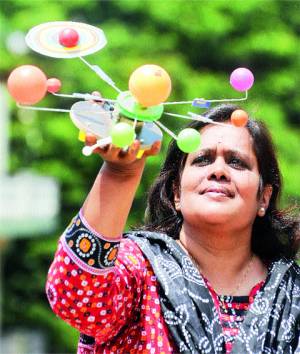As frustrated students turn their backs on the many marvels of science, it wouldn’t be too far from the truth to say that theory can really bog down even the most enthusiastic spirit. So, children digress from the idea of innovation, preferring to pick an engineering degree or a media course over a life of research and discovery.
When Dr Sujata Virdhe discovered the many joys of experiential living, there was no stopping her on her journey to her dream. She quit a job at the Indian Space Research Organisation where she worked as a scientist in the fields of satellite power systems, solar energy and indigenisation of electronic components for two decades, and decided to follow her dream.
To open the eyes of every child to the magnificent universe of which we are all a part, where miracles happen every day should we choose to see them.
Catering to children between the ages of 10 and 15, the Sunday Science School (SSS) has already received a wonderful response from Maharashtra, where it was first started. The first branch in Bengaluru was set up in Domlur, with the second being inaugurated in Vijayanagar on Sunday. Dr Virde is looking at centres in Mysore, Dharwad, Hubli, Mangalore and Udupi.
“Eminent educationists feel that there is a need for hands-on learni of science, which is made unduly complicated by definitions and descriptions. This takes away the real beauty of the subject and students not only lose interest but become terrified by science,” says Dr Virdhe.
Hence, the science-by-doing module, which is aimed at kindling a love for science and research in every child. “Trained science communicators can communicate science using our readily available practical material to prepare our children for logical, rational and scientific thinking,” Dr Virdhe says.
It all started when Dr Virdhe met students whose parents were very worked up about their children being unable to grasp even the simplest scientific concepts. “I took them to the kitchen and taught them, which was when I discovered experiential learning and how important it is,” says Dr Virdhe.
Driven by a deep interest in the subject, Dr Virdhe began to collect information from textbooks for 7th grade to 12th grade children, designing her own syllabus to make learning science as hands-on and fun as possible. “The SSS wouldn’t have happened without my brother, Suyash Dake, who quit a lucrative IT job in Pune to help me realise my dream,” she says.
As a hobby, Dr Virdhe began designing tools and toys that would teach children science in the most fun way possible. “I happened to give some students a practical workshop on photovoltaic cells, which is how I knew that my passion was designing toys to teach children.”
While there are many, many products out there that can help children learn, most don’t reach them at all, for parents are simply too busy to bother. “We want to fill this gap in parenting because many parents don’t really have the time to spend with their kids,” she says.
At SSS, children are provided with all the materials they need and asked to conduct experiments with them. While the kids are given the help they need, they are, for the most part, allowed to
figure things out on their own. “We have two hours a week and when I see how engrossed the children become, it makes me want to take this to schools, too.”
Parents these days, feels Dr Virdhe, simply don’t have the time to run around for their children. Even if they are willing to do what it takes, finding materials is so hard to do and involves so much
running around that the task is given up on even before it is begun.
The first level makes sure that the children are given a strong foundation, while Level 2 has more
in-depth experiments in electronics, electromagnetism, apex microscopes and the like. “It’s like high school science and a lot more,” explains Dr Virdhe.
Dr Virdhe says the response in Maharashtra was overwhelming and has motivated them to push the dream even further. As children are allowed to explore their boundaries at their own pace, the ultimate aim of education is slowly achieved, for kids are not left with truckloads of information through which they must navigate. Instead, they are left with a tool far greater than that — imagination.
source: http://www.DeccanChronicle.com / Home> Channels> Cities> Bengaluru / by Darshana Ramdev / DC, Bengaluru / May 28th, 2012
